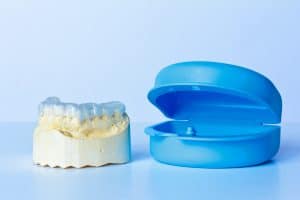 Bruxism is a disorder related to TMD (temporomandibular disease), but involves regularly grinding and clenching your teeth. Pressure on your smile not only leads to discomfort, but could damage your teeth and cause a higher risk of issues like cavities or infection. In today’s blog, your Astoria, NY, dentist, looks at common warning signs, and how we stop chronic teeth grinding.
Bruxism is a disorder related to TMD (temporomandibular disease), but involves regularly grinding and clenching your teeth. Pressure on your smile not only leads to discomfort, but could damage your teeth and cause a higher risk of issues like cavities or infection. In today’s blog, your Astoria, NY, dentist, looks at common warning signs, and how we stop chronic teeth grinding.
The Causes of Bruxism
A number of different factors could cause us to grind and clench our teeth on a nightly basis. Common causes often include untreated TMJ disorder, high levels of stress in your daily life, misalignment, bite imbalance, injury to the face or jaw, or untreated tooth loss. As part of our treatment approach, we will carefully examine your smile, using digital technology to carefully examine the wear and friction on your teeth and the balance of your bite, so we can choose the best treatment option for your smile.
Potential Smile Damage
The dangers of ignoring bruxism is the chance for damage to your smile. The constant pressure from grinding could begin to wear down the tooth enamel, or even crack or chip a tooth. The inner tissues, which are much more sensitive than enamel, are then exposed to bacteria, leading to the onset of a cavity or infection. Over time, the damage could even make teeth appear short. Following treatment for your bruxism, we can discuss options to repair any worn-down or damaged teeth, such as single-visit dental bonding or a custom-made dental crown.
Possible Treatment Options
To stop teeth grinding, we may use orthodontics to correct your misalignment, including our barely noticeable ClearCorrect aligners. Custom-made restorations could also assist in improving overall bite balance. However, the most common treatment option is an oral appliance. Like what we use to treat TMJ disorder, this device is created based on impressions and measurements of your smile, ensuring a proper fit. This repositions the jaw to help stop unnecessary strain, and also protects your teeth from further damage by putting a strong barrier between your upper and lower sets of teeth. You can also help by reducing stress in your daily life, cutting back on caffeinated beverages, and avoiding chewing on hard objects like ice, pens, or pencils. If you have any questions about treating bruxism, or about steps to prevent it, then contact our team today.
Do You Have Questions About Stopping Teeth Grinding?
We don’t want issues like bruxism to lead to serious complications for your smile’s health and beauty, which is why we offer treatment. With our general and preventive treatment options, we can help you maintain a strong and healthy smile. To learn more about treating issues like bruxism, then schedule a consultation by calling Jeffrey Leibowitz, DDS, in Astoria, NY, today at 718-728-8320.


